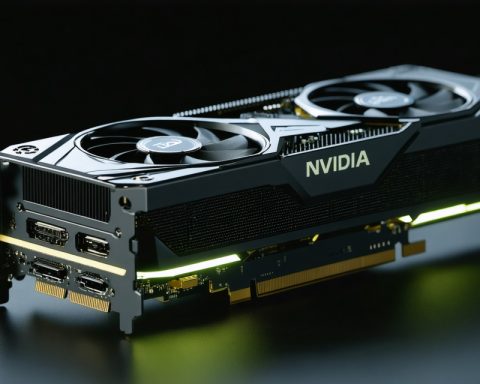Significant Losses Rock America’s Tech Giants
In a shocking turn of events, several notable billionaires saw their wealth significantly diminish due to the unforeseen impact of the Chinese startup DeepSeek’s groundbreaking generative artificial intelligence model. This development sent shockwaves through the U.S. stock market, with Nvidia being the primary casualty.
As Nvidia shares fell by a staggering 16%, the company’s market capitalization plunged by over $500 billion. This dramatic decline resulted in a notable drop in net worth for Jensen Huang, Nvidia’s CEO and largest shareholder, whose fortune decreased by nearly $20 billion within hours, plummeting him several ranks on Forbes’ real-time billionaires list.
Larry Ellison, chairman of Oracle, faced a parallel fate, losing approximately $24.9 billion. His company’s stocks dipped by 13%, knocking him behind Mark Zuckerberg in the global wealth rankings.
Many tech firms struggled amidst this market turmoil, prompting doubts about future investments in AI technologies. The rise of DeepSeek’s AI model, developed at a fraction of the cost compared to American competitors, has raised concerns regarding the sustainability of high valuations enjoyed by U.S. tech giants.
While most Silicon Valley billionaires faced losses, Meta’s Zuckerberg experienced a positive turn, gaining over $2 billion as Meta’s shares increased. Apple also stood out, with its stock price surging by around 3%, bolstering the fortunes of its CEO and other influential figures associated with the company.
Broadening Consequences of AI Disruptions in Tech
The recent upheaval triggered by the emergence of DeepSeek’s generative AI model not only highlights the volatility of tech stocks but also signals a potential paradigm shift in the global economy and competitive landscape. As U.S. tech giants face increasing challenges from more agile and cost-effective international competitors, the implications extend beyond individual fortune losses; they may transform investment strategies and corporate priorities across the industry.
The cultural fabric of innovation is also at stake. As American companies grapple with their waning dominance, there could be a shifting narrative around what defines leadership in AI technology. The growing accessibility of advanced tech tools means that innovation may soon spring from unexpected quarters, pushing businesses to rethink how they cultivate talent and resources.
Moreover, the environmental impact of AI development cannot be ignored. As tech companies ramp up AI investments to maintain competitiveness, a surge in energy consumption is anticipated, given AI’s heavy computational needs. This raises questions about the sustainability of such expansions, especially in light of the global push toward reducing carbon footprints.
In light of these developments, the future landscape may see a push toward collaborative ecosystems, where U.S. firms engage more with emerging players to remain relevant. The focus could shift significantly toward strategic partnerships that balance innovation with environmental and social governance, altering the long-term significance of technological advancement.
Tech Titans Face Downfall: Unpacking the Fallout from DeepSeek’s AI Disruption
Significant Losses Rock America’s Tech Giants
In a rapid transformation of the technology landscape, America’s most prominent billionaires have witnessed substantial declines in their net worths due to the unexpected impact of DeepSeek, a Chinese startup that has unveiled an innovative generative artificial intelligence model. This shockwave has led to considerable turbulence in the U.S. stock market, most acutely affecting Nvidia.
Nvidia’s stock values plummeted by an alarming 16%, resulting in a staggering market capitalization loss exceeding $500 billion. This downturn had an immediate effect on Jensen Huang, Nvidia’s CEO and major shareholder, whose wealth tumbled by nearly $20 billion within hours. This dramatic financial shift caused Huang to drop several positions on Forbes’ real-time billionaires list.
Similarly, Larry Ellison, the chairman of Oracle, saw his fortune take a hit, with a loss of about $24.9 billion as Oracle’s shares dropped by 13%. This decline relegated him behind Facebook’s Mark Zuckerberg in global wealth rankings, demonstrating how quickly fortunes can change in the volatile tech market.
Market Trends and Implications
The emergence of DeepSeek’s generative AI technology at a fraction of the development cost compared to American rivals raises critical questions regarding the sustainability and future valuations of U.S. tech giants. As this new competitor gains traction, many companies are reevaluating their investments in AI infrastructure and development.
Use Cases of Generative AI
Generative AI is being rapidly adopted across various industries, including:
– Content Creation: Automating the writing of articles, reports, and creative content.
– Design: Assisting in the creation of images, animations, and even architecture blueprints.
– Healthcare: Predicting patient outcomes and analyzing data for improved treatment plans.
Pros and Cons of Generative AI
Pros:
– Accelerated productivity in various sectors.
– Cost-effective solutions for companies.
– Enhanced creativity and innovation through collaboration with AI.
Cons:
– Potential job displacement in creative fields.
– Ethical concerns surrounding AI-generated content.
– Risk of over-reliance on technology for critical decisions.
Security Aspects
As AI technology advances, concerns about data security and privacy have burgeoned. Businesses must implement stringent policies to protect sensitive data while utilizing AI systems. Security measures should encompass:
– Data Encryption: Safeguarding user data against breaches.
– Access Controls: Ensuring only authorized individuals interact with AI systems.
– Regular Audits: Monitoring the effectiveness of security processes.
Market Analysis and Predictions
Analysts predict that the rise of generative AI could lead to a significant restructuring of the technology sector. Established firms will need to adapt quickly to survive amidst new competitors like DeepSeek. Investments in innovative technology might shift, focusing more on sustainability and efficiency rather than just growth.
Innovations in AI Technology
DeepSeek’s entry into the market may catalyze innovations among U.S. tech giants, prompting them to invest more heavily in R&D for more advanced and cost-effective AI solutions. This could usher in a new era where efficiency trumps sheer market dominance.
Conclusion
The significant wealth declines of tech moguls underscore the shifting dynamics of the technology landscape. As new players like DeepSeek disrupt traditional markets, established companies must adapt or risk falling behind in an increasingly competitive field. The future prospects for AI developments remain bright, but the challenges posed by ethical concerns and security measures must be addressed to harness their full potential.
For more insights on technology trends and updates, visit Tech Giant News.













